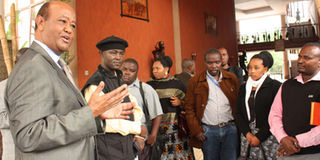EDITORIAL: Peace in South Sudan good for Tanzania, EAC

CCM secretary general Abdulrahman Kinana speaks to reporters in Arusha yesterday about South Sudan’s peace deal aimed at ending a civil war that has rocked the country since December 2013 killing thousands of innocent people. PHOTO | PETER SARAMBA
What you need to know:
- Tanzania’s ruling party got involved in the South Sudan peace talks in October last year after President Salva Kiir requested his counterpart, Mr Jakaya Kikwete, to spearhead dialogue within the Sudan People’s Liberation Movement to complement Intergovernmental Authority on Development (Igad)-led negotiations.
Peace in South Sudan is good for the East African region, so much so that we can only hope and pray that the reconciliation process—brokered by CCM on Tuesday—is fast-tracked.
Tanzania’s ruling party got involved in the South Sudan peace talks in October last year after President Salva Kiir requested his counterpart, Mr Jakaya Kikwete, to spearhead dialogue within the Sudan People’s Liberation Movement to complement Intergovernmental Authority on Development (Igad)-led negotiations.
Lasting peace in Africa’s youngest nation offers security and economic benefits to the entire EAC. In October last year, Tanzania, through Agriculture, Food Security and Co-operatives minister Christopher Chiza—announced having sealed a deal with South Sudan to allow traders in East Africa’s second largest economy to sell maize and rice in Juba.
With a 43 per cent rise in maize production—from 350 million the previous season to 500 million metric tonnes in the current season—Tanzania needs more than its traditional markets to put a smile on the faces of our farmers. There is also a surplus rice harvest.
With $41 billion in GDP, Tanzania’s economy is at a stage where local companies can effectively invest in weaker foreign economies and bring the profits back to Dar es Salaam. CRDB Bank is doing well in Burundi while Exim Bank is already doing business in Djibouti and in the Comoros. There is no reason why similar outlets should not be opened in South Sudan.
Regionally, Ugandan traders are already doing a great deal of business with their South Sudanese counterparts while four Kenyan banks—Kenya Commercial Bank, Equity Bank, Co-operative Bank and CFC Stanbic—already have operations in South Sudan.
Peace in South Sudan means businesses in Africa’s youngest country can weave easily through improved roads, ports, railways and airports in Tanzania, Kenya, Uganda, Rwanda and Burundi. Delays in striking a peace deal will hold back economic development in the region.




